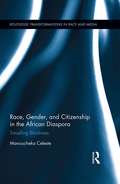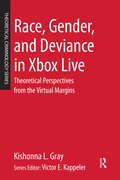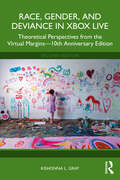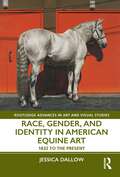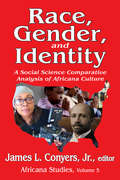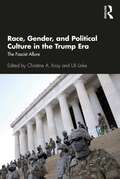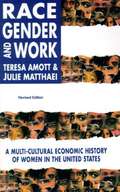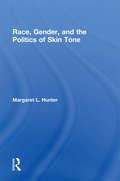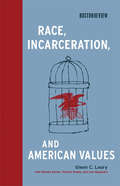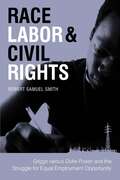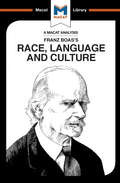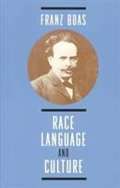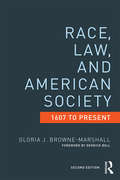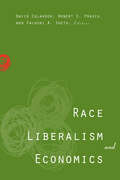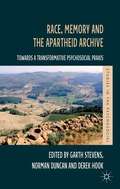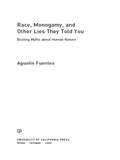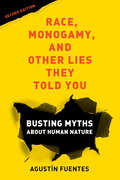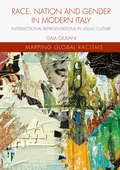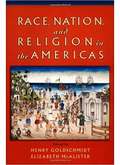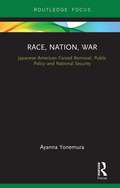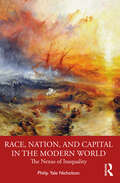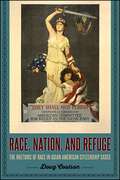- Table View
- List View
Race, Gender, and Citizenship in the African Diaspora: Travelling Blackness (Routledge Transformations in Race and Media)
by Manoucheka CelesteWinner of the National Communication Association's 2018 Diamond Anniversary Book Award With the exception of slave narratives, there are few stories of black international migration in U.S. news and popular culture. This book is interested in stratified immigrant experiences, diverse black experiences, and the intersection of black and immigrant identities. Citizenship as it is commonly understood today in the public sphere is a legal issue, yet scholars have done much to move beyond this popular view and situate citizenship in the context of economic, social, and political positioning. The book shows that citizenship in all of its forms is often rhetorically, representationally, and legally negated by blackness and considers the ways that blackness, and representations of blackness, impact one’s ability to travel across national and social borders and become a citizen. This book is a story of citizenship and the ways that race, gender, and class shape national belonging, with Haiti, Cuba, and the United States as the primary sites of examination.
Race, Gender, and Class in Criminology: The Intersections (Routledge Library Editions: Women and Crime #4)
by Martin D. Schwartz Dragan MilovanovicThese essays, first published in 1996, focus on class, race, and gender as organising and analytical concepts in criminology. For many years, their importance in studying how the world relates to crime and its control was minimized or ignored. It is clear, however, that these concepts are of critical importance in understanding societal issues, especially crime and societal responses to it. This title will be of interest to students of criminology.
Race, Gender, and Deviance in Xbox Live: Theoretical Perspectives from the Virtual Margins
by Kishonna L. GrayRace, Gender, and Deviance in Xbox Live provides a much-needed theoretical framework for examining deviant behavior and deviant bodies within one of the largest virtual gaming communities—Xbox Live. Previous research on video games has focused mostly on violence and examining violent behavior resulting from consuming this medium. This limited scope has skewed criminologists' understanding of video games and video game culture. Xbox Live has proven to be more than just a gaming platform for users. It has evolved into a multimedia entertainment outlet for more than 20 million users. This book examines the nature of social interactions within Xbox Live, which are often riddled with deviant behavior, including but not limited to racism and sexism. The text situates video games within a hegemonic framework deploying whiteness and masculinity as the norm. The experiences of the marginalized bodies are situated within the framework of deviance as they fail to conform to the hegemonic norm and become victims of racism, sexism, and other types of harassment.
Race, Gender, and Deviance in Xbox Live: Theoretical Perspectives from the Virtual Margins—10th Anniversary Edition
by Kishonna L. GrayBy focusing on the experiences of users, gamers, and audiences inside one of the world’s largest gaming communities (Xbox Live), this book provides an overview of the landscape, architecture, and socio-technical structure of console gaming. Building on previous research regarding race, gender, and technology, it provides a much-needed intersectional approach to virtual gaming communities. It draws from a wide breadth of disciplines and interviews with minoritized and marginalized users to offer an overview of the virtual oppressions these individuals navigate and resist.In this 10th Anniversary Edition, author Kishonna L. Gray introduces the audience to a perspective on console gaming environments called “Multi-mediated Interactive Console Environments.” This new chapter provides a necessary understanding of these dynamic digital communities, adding console games, which have been heretofore left out of conversations on gaming, to platform studies, and addressing troubling examples on race, gender, and other identities. While the majority of scholarship on gaming comes from disciplines related to media studies and communication, it is imperative that other scholars engage the narrative and help move the focus on gaming beyond acts of violence or as a space that propels the military–industrial complex.By bringing together cultural studies, criminology, media studies, game studies, and others, this text offers interdisciplinary approaches to making sense of not only the technology and its impact on users and cultures but also the impact that (sub) cultures have had on gaming. It is essential reading for scholars and practitioners seeking solutions to some of gaming’s biggest challenges such as how to reduce harm in online gaming.
Race, Gender, and Identity in American Equine Art: 1832 to the Present (Routledge Advances in Art and Visual Studies)
by Jessica DallowThis book traces an evolution of equine and equestrian art in the United States over the last two centuries to counter conventional understandings of subjects that are deeply enmeshed in the traditions of elite English and European culture. In focusing on the construction of identity in painting and photography—of Blacks, women, and the animals themselves involved in horseracing, rodeo, and horse show competition—it illuminates the strategic and varying roles visual artists have played in producing cultural understandings of human-animal relationships. As the first book to offer a history of American equine and equestrian imagery, it shrinks the chasm of literature on the subject and illustrates the significance of the genre to the history of American art. This book further connects American equine and equestrian art to historical, theoretical, and philosophical analyses of animals and attests to how the horse endures as a vital, meaningful subject within the art world as well as culture at large. This book will be of interest to scholars in art history, American art, gender studies, race and ethnic studies, and animal studies.
Race, Gender, and Identity: A Social Science Comparative Analysis of Africana Culture (Africana Studies)
by James L. ConyersThis volume examines race, gender, and identity in African American culture. As with previous volumes in the series, these collected essays provide a social science and interdisciplinary framework for the exploration of Africana cultural and social phenomena. The contributors have adopted mixed methods and meta-theory tools of analysis to describe and evaluate these issues from an African-centered perspective.Kameelah Martin examines the role of women in the films of Julie Dash and Kasi Lemmons. Toya Roberts offers an experimental study of African American males at predominantly white institutions of higher education. Rochelle Brocks digs into the transition, transformation, and transcendence of civil rights to the Black Arts/Black Power movements for social change. Portia K. Maultsby provides an ethnographic study, inspecting the genre of funk music in the United States. James L. Conyers, Jr. analyzes the doctoral dissertation of W. E. B. Du Bois, which cataloged the impact of colonialism on Africana culture. Kesha Morant Williams and Ronald L. Jackson II examine the impact of lupus on the identity of African American women. Ronald Turner's essay examines black workers challenging racist practices by their union representatives. Lisbeth Gant-Britton renders a conceptual history of the hip-hop community, with emphasis on international issues. This volume is an invaluable sourcebook for those studying African American affairs, history, and cultural studies.
Race, Gender, and Leadership in Nonprofit Organizations
by Marybeth Gasman Noah D. Drezner Edward Epstein Tyrone Freeman Vida L. AveryThis volume centers on the lives and experiences of female and African American leaders of foundations and nonprofits. Contributors to the volume examine race and gender as constructs and provide a theoretical background for understanding their effect on the psycho-social development of the individuals.
Race, Gender, and Political Culture in the Trump Era: The Fascist Allure
by Uli Linke Christine A. KrayThis book demonstrates the fragility of democratic norms and institutions, and the allure of fascist politics within the Trump era. The chapters consider the antagonistic cultural practices through which divergent political machinations, including white (patriarchal) nationalism, are staged, and examine the corresponding policies and governing practices that threaten the civil rights, security, and wellbeing of racialized minorities, immigrants, women, and gender nonconforming people. The book contributes to social theory on nation-building by delineating processes of exclusion, intimidation, and violence, with a focus on rhetoric, performance, semiotics, music, affectivity, and the power of media. Various chapters also analyze creative, restorative, and at times unruly practices of community building, which reknit the social fabric with expansive visions of the polity. This anthropology-led volume incorporates contributions from a number of disciplines including sociology, American studies, communication, and Spanish, and will be of interest to scholars across the social sciences and humanities.
Race, Gender, and Work: A Multi-cultural Economic History of Women in the United States
by Teresa Amott Julia A. MattaeiThe lives of working women and their contributions to American economic history are considered in a fine blend of biography and social and political history.
Race, Gender, and the Politics of Skin Tone
by Margaret L. HunterRace, Gender, and the Politics of Skin Tone tackles the hidden yet painful issue of colorism in the African American and Mexican American communities. Beginning with a historical discussion of slavery and colonization in the Americas, the book quickly moves forward to a contemporary analysis of how skin tone continues to plague people of color today. This is the first book to explore this well-known, yet rarely discussed phenomenon.
Race, Incarceration, and American Values
by Glenn C. LouryThe United States, home to five percent of the worlds' population, now houses twenty-five percent of the world's prison inmates. Our incarceration rate--at 714 per 100,000 residents and rising--is almost forty percent greater than our nearest competitors (the Bahamas, Belarus, and Russia). More pointedly, it is 6.2 times the Canadian rate and 12.3 times the rate in Japan. Economist Glenn Loury argues that this extraordinary mass incarceration is not a response to rising crime rates or a proud success of social policy. Instead, it is the product of a generation-old collective decision to become a more punitive society. He connects this policy to our history of racial oppression, showing that the punitive turn in American politics and culture emerged in the post-civil rights years and has today become the main vehicle for the reproduction of racial hierarchies. Whatever the explanation, Loury agues, the uncontroversial fact is that changes in our criminal justice system since the 1970s have created a nether class of Americans--vastly disproportionately black and brown--with severely restricted rights and life chances. Moreover, conservatives and liberals agree that the growth in our prison population has long passed the point of diminishing returns. Stigmatizing and confining of a large segment of our population should be unacceptable to Americans. Loury's call to action makes all of us now responsible for ensuring that the policy changes. Praise for The Anatomy of Racial Inequality: "Intellectually rigorous and deeply thoughtful.... The Anatomy of Racial Inequalityis an incisive, erudite book by a major thinker." --Gerald Early, New York Times Book Review A Boston Review Book
Race, Incarceration, and American Values (Boston Review Books)
by Glenn C. LouryWhy stigmatizing and confining a large segment of our population should be unacceptable to all Americans.The United States, home to five percent of the world's population, now houses twenty-five percent of the world's prison inmates. Our incarceration rate—at 714 per 100,000 residents and rising—is almost forty percent greater than our nearest competitors (the Bahamas, Belarus, and Russia). More pointedly, it is 6.2 times the Canadian rate and 12.3 times the rate in Japan. Economist Glenn Loury argues that this extraordinary mass incarceration is not a response to rising crime rates or a proud success of social policy. Instead, it is the product of a generation-old collective decision to become a more punitive society. He connects this policy to our history of racial oppression, showing that the punitive turn in American politics and culture emerged in the post-civil rights years and has today become the main vehicle for the reproduction of racial hierarchies. Whatever the explanation, Loury argues, the uncontroversial fact is that changes in our criminal justice system since the 1970s have created a nether class of Americans—vastly disproportionately black and brown—with severely restricted rights and life chances. Moreover, conservatives and liberals agree that the growth in our prison population has long passed the point of diminishing returns. Stigmatizing and confining of a large segment of our population should be unacceptable to Americans. Loury's call to action makes all of us now responsible for ensuring that the policy changes.
Race, Labor, and Civil Rights: Griggs versus Duke Power and the Struggle for Equal Employment Opportunity (Making the Modern South)
by Robert Samuel SmithIn 1966, thirteen black employees of the Duke Power Company's Dan River Plant in Draper, North Carolina, filed a lawsuit against the company challenging its requirement of a high school diploma or a passing grade on an intelligence test for internal transfer or promotion. In the groundbreaking decision Griggs v. Duke Power (1971), the United States Supreme Court ruled in favor of the plaintiffs, finding such employment practices violated Title 7 of the Civil Rights Act of 1964 when they disparately affected minorities. In doing so, the court delivered a significant anti-employment discrimination verdict. Legal scholars rank Griggs v. Duke Power on par with Brown v. Board of Education (1954) in terms of its impact on eradicating race discrimination from American institutions. In Race, Labor, and Civil Rights, Robert Samuel Smith offers the first full-length historical examination of this important case and its connection to civil rights activism during the second half of the 1960s. Smith explores all aspects of Griggs, highlighting the sustained energy of the grassroots civil rights community and the critical importance of courtroom activism. Smith shows that after years of nonviolent, direct action protests, African Americans remained vigilant in the 1960s, heading back to the courts to reinvigorate the civil rights acts in an effort to remove the lingering institutional bias left from decades of overt racism. He asserts that alongside the more boisterous expressions of black radicalism of the late sixties, foot soldiers and local leaders of the civil rights community -- many of whom were working-class black southerners -- mustered ongoing legal efforts to mold Title 7 into meaningful law. Smith also highlights the persistent judicial activism of the NAACP-Legal Defense and Education Fund and the ascension of the second generation of civil rights attorneys. By exploring the virtually untold story of Griggs v. Duke Power, Smith's enlightening study connects the case and the campaign for equal employment opportunity to the broader civil rights movement and reveals the civil rights community's continued spirit of legal activism well into the 1970s.
Race, Language and Culture
by Anna Seiferle-ValenciaFranz Boas’s 1940 Race, Language and Culture is a monumentally important text in the history of its discipline, collecting the articles and essays that helped make Boas known as the ‘father of American anthropology.’ An encapsulation of a career dedicated to fighting against the false theories of so-called ‘scientific racism’ that abounded in the first half of the 20th-century, Race, Language and Culture is one of the most historically significant texts in its field – and central to its arguments and impact are Boas’s formidable interpretative skills. It could be said, indeed, that Race, Language and Culture is all about the centrality of interpretation in questioning our assumptions about the world. In critical thinking, interpretation is the ability to clarify and posit definitions for the terms and ideas that make up an argument. Boas’s work demonstrates the importance of another vital element: context. For Boas, who argued passionately for ‘cultural relativism,’ it was vital to interpret individual cultures by their own standards and context – not by ours. Only through comparing and contrasting the two can we reach, he suggested, a better understanding of humankind. Though our own questions might be smaller, it is always worth considering the crucial element Boas brought to interpretation: how does context change definition?
Race, Language and Culture
by Franz BoasThis volume is a collection of the most important essays written by Franz Boas on the science of anthropology. <p><p> "Franz Boas is the father of American anthropology and one of the founders of the field of modern anthropology. The book, Race, Language, and Culture, is a collection of some of his most important essays."—David Schneider, University of Chicago<p> "An exceptional book. Exceptional because it brings into one volume sixty-two papers written by the most influential figure in American anthropology. . . . Exceptional in that it exhibits the wide range of interests and scientific exactness which made it possible for one man to exert such a profound influence on the growing science of anthropology. . . . This is a volume every student of anthropology will wish to possess; it will also have a wide distribution among other students of the social sciences, and all interested in the problems of race."—Fay-Cooper Cole, American Anthropologist
Race, Law, and American Society: 1607-Present (Criminology and Justice Studies)
by Gloria J. Browne-MarshallThis second edition of Gloria Browne-Marshall’s seminal work , tracing the history of racial discrimination in American law from colonial times to the present, is now available with major revisions. Throughout, she advocates for freedom and equality at the center, moving from their struggle for physical freedom in the slavery era to more recent battles for equal rights and economic equality. From the colonial period to the present, this book examines education, property ownership, voting rights, criminal justice, and the military as well as internationalism and civil liberties by analyzing the key court cases that established America’s racial system and demonstrating the impact of these court cases on American society. This edition also includes more on Asians, Native Americans, and Latinos. Race, Law, and American Society is highly accessible and thorough in its depiction of the role race has played, with the sanction of the U.S. Supreme Court, in shaping virtually every major American social institution.
Race, Liberalism, and Economics
by Robert E. Prasch Falguni A. Sheth David C. ColanderNoneconomists often think that economists' approach to race is almost exclusively one of laissez-faire. Racism, Liberalism, and Economics argues that economists' ideas are more complicated. The book considers economists' support of markets in relation to the challenge of race and race relations and argues that their support of laissez-faire has traditionally been based upon a broader philosophical foundation of liberalism and history: what markets have and have not achieved in the past, and how that past relates to the future. The book discusses the concepts of liberalism and racism, the history and use of these terms, and how that history relates to policy issues. It argues that liberalism is consistent with a wide variety of policies and that the broader philosophical issues are central in choosing policies. The contributors show how the evolution of racist ideas has been a subtle process that is woven into larger movements in the development of scientific thought; economic thinking is embedded in a larger social milieu. Previous discussions of policies toward race have been constrained by that social milieu, and, since World War II, have largely focused on ending legislated and state-sanctioned discrimination. In the past decade, the broader policy debate has moved on to questions about the existence and relative importance of intangible sources of inequality, including market structure, information asymmetries, cumulative processes, and cultural and/or social capital. This book is a product of, and a contribution to, this modern discussion. It is uniquely transdisciplinary, with contributions by and discussions among economists, philosophers, anthropologists, and literature scholars. The volume first examines the early history of work on race by economists and social scientists more generally. It continues by surveying American economists on race and featuring contributions that embody more modern approaches to race within economics. Finally it explores several important policy issues that follow from the discussion. ". . . adds new insights that contribute significantly to the debate on racial economic inequality in the U. S. The differing opinions of the contributors provide the broad perspective needed to examine this extremely complex issue. " --James Peoples, University of Wisconsin-Milwaukee "There is an immense economic literature on racial discrimination, employing a variety of models and decomposition methods. This volume makes a unique contribution by focusing on the philosophical assumptions at the root of this analysis and by presenting many sides of the very vigorous debate surrounding these controversial issues. " --Thomas Maloney, University of Utah "By focusing upon the progress of analytical technique, historians of economic thought have grossly neglected the symbiotic relation of economics to public policy and ideology. This collection of essays offers a most welcome breach of disciplinary apartheid. Seizing upon recent research in the almost forgotten writings about race of Classical economists and their contemporaries, it relates nineteenth-century ideas to current debates about economic discrimination and other manifestations of racism. As the writing is both learned and lively, the book should appeal both to the generally educated reader and to teachers of courses in multiculturalism. " --Melvin Reder, Isidore Brown and Gladys J. Brown Professor Emeritus of Urban and Labor Economics, University of Chicago
Race, Memory and the Apartheid Archive
by Derek Hook Garth Stevens Norman DuncanRace, Memory and the Apartheid Archive: Towards a Transformative Psychosocial Praxis draws on a psychosocial approach that is uniquely suited to the socio-historical and psychical analysis of racism. The book relies mainly on the memories, stories and narratives of ordinary people living in apartheid South Africa.
Race, Monogamy, and Other Lies They Told You
by Agustín FuentesThere are three major myths of human nature: humans are divided into biological races; humans are naturally aggressive; men and women are truly different in behavior, desires, and wiring. In an engaging and wide-ranging narrative Agustín Fuentes counters these pervasive and pernicious myths about human behavior. Tackling misconceptions about what race, aggression, and sex really mean for humans, Fuentes incorporates an accessible understanding of culture, genetics, and evolution requiring us to dispose of notions of "nature or nurture." Presenting scientific evidence from diverse fields, including anthropology, biology, and psychology, Fuentes devises a myth-busting toolkit to dismantle persistent fallacies about the validity of biological races, the innateness of aggression and violence, and the nature of monogamy and differences between the sexes. A final chapter plus an appendix provide a set of take-home points on how readers can myth-bust on their own. Accessible, compelling, and original, this book is a rich and nuanced account of how nature, culture, experience, and choice interact to influence human behavior.
Race, Monogamy, and Other Lies They Told You, Second Edition: Busting Myths about Human Nature
by Agustín FuentesA compelling takedown of prevailing myths about human behavior, updated and expanded to meet the current moment. There are three major myths of human nature: humans are divided into biological races; humans are naturally aggressive; and men and women are wholly different in behavior, desires, and wiring. Race, Monogamy, and Other Lies They Told You counters these pervasive and pernicious myths about human behavior. Agustín Fuentes tackles misconceptions about what race, aggression, and sex really mean for humans, and incorporates an accessible understanding of culture, genetics, and evolution that requires us to dispose of notions of "nature or nurture." Presenting scientific evidence from diverse fields, including anthropology, biology, and psychology, Fuentes devises a myth-busting toolkit to dismantle persistent fallacies about the validity of biological races, the innateness of aggression and violence, and the nature of monogamy, sex, and gender. This revised and expanded edition provides up-to-date references, data, and analyses, and addresses new topics, including the popularity of home DNA testing kits and the lies behind ‘"incel" culture; the resurgence of racist, nativist thinking and the internet's influence in promoting bad science; and a broader understanding of the diversity of sex and gender.
Race, Nation and Gender in Modern Italy: Intersectional Representations In Visual Culture (Mapping Global Racisms)
by Gaia GiulianiThis book explores intersectional constructions of race and whiteness in modern and contemporary Italy. It contributes to transnational and interdisciplinary reflections on these issues through an analysis of political debates and social practices, focusing in particular on visual materials from the unification of Italy (1861) to the present day. Giuliani draws attention to rearticulations of the transnationally constructed Italian ‘colonial archive’ in Italian racialised identity-politics and cultural racisms across processes of nation building, emigration, colonial expansion, and the construction of the first post-fascist Italian society. The author considers the ‘figures of race’ peopling the Italian colonial archive as composing past and present ideas and representations of (white) Italianness and racialised/gendered Otherness. Students and scholars across a range of disciplines, including Italian studies, political philosophy, sociology, history, visual and cultural studies, race and whiteness studies and gender studies, will find this book of interest.
Race, Nation, And Religion In The Americas
by Henry Goldschmidt Elizabeth McAlisterThe pioneering essays collected in this volume bring critical new perspectives to the interdisciplinary study of racial, national, and religious identities. The authors demonstrate that one cannot study these categories of identity formation in isolation, but must instead examine the ways each intersects with-and ultimately helps construct-the others. This innovative theoretical perspective sheds new light on the role of religion in shaping the lives of diverse communities throughout the Americas and forces us to reevaluate the reductive opposition between secular and religious identities. The twelve essays in the volume explore the ties between race, nation, and religion in ethnographic and historical detail. Topics range from Jesuit mission work to Hollywood film, manifest destiny to liberation theology, the Haitian Rara festival to American immigration law. In these and other contexts, the authors explore the intertwined histories of a hemisphere defined at the charged intersections of race, nation, and religion.
Race, Nation, War: Japanese American Forced Removal, Public Policy and National Security
by Ayanna YonemuraThis book examines international post-9/11 policies by connecting them to the US violations of Japanese Americans’ human rights during World War II. Analysing the policies of the United States, Race, Nation, War illustrates how ideas of race and masculinity shaped the indefinite leave policy which the government used to move Japanese Americans out of camps during the war. With attention to recent American and European policies, the author demonstrates that race, gender, and nation also converge in President Trump’s policies on refugees and human rights, the German and European migrant crises, and related German policies and politics. Assayed from a unique city and regional planning perspective, Race, Nation, War will appeal not only to scholars of planning, but also to those with interests in American Studies, gender studies, race and ethnicity, sociology, history, and public policy.
Race, Nation, and Capital in the Modern World: The Nexus of Inequality
by Philip Y. NicholsonRace, Nation, and Capital in the Modern World is a comprehensive yet concise book that traces the history of racism, nationalism and capitalism from their combined origins at the end of the fifteenth century to the present. This book describes the development of legal codes and institutional practices that brought vast wealth and power to their chief beneficiaries, along with great suffering, exploitation and destruction to its victims. Instead of understanding racism as an aberration or dark flaw in the troubled past of a world power like the United States, this synthesis places race and racism in the forefront of the unfolding history of nationalism and capitalism. The work de-emphasizes the uniqueness of each nation’s particular experience by showing the interdependence of capitalist and racist practices. The narrative follows the leading hegemonic national powers as they expanded from mercantile conquests through plantation enslavement, massive displacement of populations, colonialism, global warfare and finally the tenacious contemporary aftermath. There are no comparable surveys for undergraduates or general readers seeking a unified historical understanding of these primary drivers of modernity. It is a provocative introductory guide and not a work of political theory. This volume will appeal to students, scholars and those interested in studies on racism, race, capital, the history of inequality and human and civil rights.
Race, Nation, and Refuge: The Rhetoric of Race in Asian American Citizenship Cases
by Doug CoulsonFrom 1870 to 1940, racial eligibility for naturalization in the United States was limited to "free white persons" and "aliens of African nativity and persons of African descent," and many interpreted these restrictions to reflect a policy of Asian exclusion based on the conclusion that Asians were neither white nor African. Because the distinction between white and Asian was considerably unstable, however, those charged with the interpretation and implementation of the naturalization act faced difficult racial classification questions. Through archival research and a close reading of the arguments contained in the documents of the US Bureau of Naturalization, especially those documents that discussed challenges to racial eligibility for naturalization, Doug Coulson demonstrates that the strategy of foregrounding shared external threats to the nation as a means of transcending perceived racial divisions was often more important to racial classification than legal doctrine. He argues that this was due to the rapid shifts in the nation's enmities and alliances during the early twentieth century and the close relationship between race, nation, and sovereignty.
